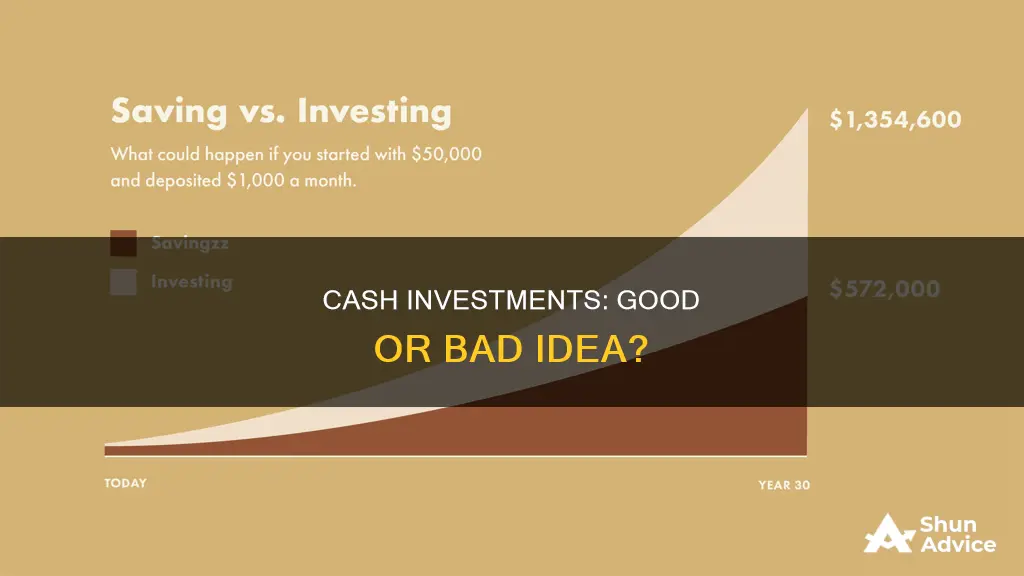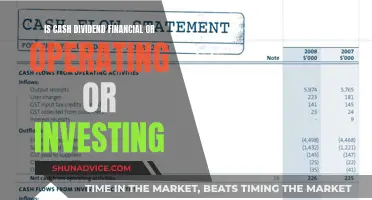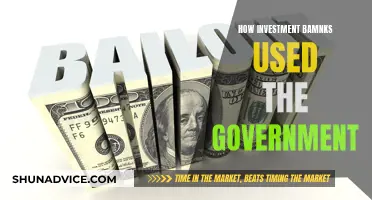
Despite cash being a popular long-term investment option, it is considered a poor choice. Billionaires Warren Buffett and Ray Dalio have both warned against holding cash as an investment. Dalio calls it the surest tax on your money, as the after-tax returns are often lower than the inflation rate. This means that cash loses value over time, and investors will fail to achieve their financial goals. Instead, financial experts recommend a range of defensive strategies, such as high and sustainable dividend stocks and gold.
| Characteristics | Values |
|---|---|
| Popularity | Cash is a popular long-term investment option for Americans, with 26% of respondents in one survey choosing it as their preferred investment option for funds available for 10 years. |
| Returns | Cash has a low return compared to other investments. Over time, cash will be worth less due to inflation. The average savings account interest rate is 0.09%, while the Consumer Price Index (inflation) rose by 2.7% in one year. |
| Impact of Inflation | The negative impact of inflation on cash is greater than the interest earned on savings accounts, resulting in a loss of buying power. |
| Alternative Investments | Other investments such as stocks, bonds, and real estate have historically provided higher returns than cash. |
| Emergency Funds | While cash is not ideal for long-term investments, having some cash on hand for emergency funds or savings is recommended. |
What You'll Learn

Cash loses value over time due to inflation
Interest rates on savings accounts are often too low to keep up with the negative impact of inflation. For example, the national average interest rate for a savings account is 0.09%, while the Consumer Price Index, which measures inflation, rose by 2.7% in the past year. This means that cash in a savings account will lose value over time.
Even in low-inflation economies like the United States, the cost of goods and services still outpaces the returns on cash investments. The best savings account interest rates are found in online-based accounts, but they still only provide an average of 0.85% in interest. This is far lower than the rate of inflation, which means that cash investments will lose value over time.
The opportunity cost of holding cash is also significant. By investing in other assets such as stocks, bonds, or real estate, investors can achieve higher returns than they would with cash. For example, the S&P 500 index produced a 9.8% average annualized total return from 1928 to 2017. By holding cash, investors miss out on these potential gains.
Overall, cash loses value over time due to inflation, and the low interest rates on savings accounts are not enough to offset this loss. This makes cash a poor investment choice compared to other assets that have the potential for higher returns.
EM Cash: Investing Strategies for Beginners
You may want to see also

Low-interest rates on savings accounts
The interest rates on savings accounts are notoriously low. According to Mandi Woodruff, the average money-market deposit account yields a mere 0.11%, and the average five-year certificate of deposit (CD) offers a meagre 0.78%inflation rate, which determines the increase in the cost of goods and services over time. As a result, the money held in these accounts loses value.
For example, according to the Bureau of Labor Statistics' (BLS) Inflation Calculator, it would take $1,495 in September 2018 to match the buying power of $1,000 in January 2000. This illustrates how the purchasing power of cash decreases over time due to inflation.
The impact of low-interest rates on savings accounts is further exacerbated by the opportunity cost of foregoing alternative investment options. As billionaire hedge fund manager Ray Dalio points out, "over a longer period of time, equities [stocks], bonds, and real estate will have a higher return than cash." Historical data supports this claim, with the S&P 500 index producing a 9.8% average annualised total return from 1928 to 2017.
Even renowned investor Warren Buffett, who is known for his substantial cash holdings, acknowledges that cash is a poor investment choice. He states, "Cash is going to become worth less over time... Cash is a bad investment over time."
The low-interest rates on savings accounts, combined with the erosive effects of inflation, result in a loss of value for cash investments. This makes it crucial for investors to explore alternative investment options that can provide higher returns and help achieve long-term financial goals.
Cash App Investing: Dividends and Your Money
You may want to see also

Cash is a poor long-term investment choice
Billionaire hedge fund manager Ray Dalio states that holding your money in cash is "the worst thing you could do". This is because cash is the "surest tax" on your money. Over time, inflation causes the goods and services you buy to become more expensive relative to the value of the cash you hold. This is especially true over the long term. For example, it would take $10,742 in September 2018 to match the buying power of $1,000 in January 1950.
Although you earn interest on money deposited in a savings account, the amount is far too low to keep up with the negative impact of inflation. The national average interest rate for a savings account is only 0.09%, while the Consumer Price Index, which measures inflation, rose 2.7% in the past year. Therefore, holding cash is a guaranteed way to lose money over time.
Other investment options, such as equities, bonds, and real estate, will have a higher return than cash over the long term. From 1928 through 2017, the S&P 500 index produced a 9.8% average annualized total return.
Warren Buffett, the Oracle of Omaha, is also known for his distaste for holding large hoards of cash. He believes that cash is a bad investment over time and that it is important to have enough cash on hand so that "nobody else can determine your future". However, he warns against letting your cash stash get too big, as your money isn't working for you to achieve your financial goals.
UBS global chief investment officer Mark Haefele agrees that a high allocation to cash over the long term increases the risk that investors will fail to achieve their financial goals. Instead, he recommends a broad range of defensive strategies, such as high and sustainable dividend stocks and gold.
Therefore, while holding some cash can provide financial security and peace of mind, it is important to remember that cash is a poor long-term investment choice due to the eroding effects of inflation.
Free Cash Flow: Investment Costs and Their Inclusion
You may want to see also

Cash investments hinder financial goals
The Problem with Cash Investments
Section
SectionIt may seem like a good idea to keep your savings in cash, especially during uncertain economic times. However, holding on to large amounts of cash as a long-term investment strategy is a poor choice. This is because cash loses value over time due to inflation, resulting in negative returns.
##The Impact of Inflation
Inflation causes the prices of goods and services to increase over time, eroding the purchasing power of your money. For example, $1,495 saved in September 2018 would be needed to match the buying power of $1,000 in January 2000. As a result, cash held over time will be worth less, negatively impacting your financial goals.
Low Interest Rates
The interest earned on cash deposits, such as savings accounts, is typically very low and fails to keep up with inflation. The national average interest rate for a savings account is 0.09%, while the Consumer Price Index, which measures inflation, rose 2.7% in the past year. This means that cash deposits lose value over time, hindering your financial goals.
Missed Opportunities for Higher Returns
By keeping your money in cash, you miss out on the potential for higher returns offered by other investment options. Over the long term, equities, bonds, and real estate have historically provided higher returns than cash. For example, the S&P 500 index produced a 9.8% average annualized total return from 1928 to 2017.
The Bottom Line
While having some cash on hand for emergencies is important, as recommended by Warren Buffett, allowing your cash stash to become too large can hinder your financial goals. Instead, consider investing in a diverse range of assets, such as stocks, bonds, or real estate, to achieve higher returns and protect your money from the negative effects of inflation.
Cash App Investing: How to Stop and Withdraw
You may want to see also

Cash is a losing strategy
The idea of keeping your money in cash may seem appealing, especially during uncertain economic times. However, holding on to cash is a losing strategy for investors in the long term. Here's why:
The impact of inflation
Inflation causes the prices of goods and services to increase over time. This means that the purchasing power of your cash decreases. As a result, your money in a savings account will lose value. Even in low-inflation economies like the United States, the cost of goods and services increases faster than the returns on cash investments. For example, the national average interest rate for a savings account is only 0.09%, while the Consumer Price Index, which measures inflation, rose by 2.7% in a year. This disparity results in a loss of money over time.
Opportunity cost
When you keep your money in cash, you miss out on the potential gains that could be achieved through investing. By keeping your money in cash, you are essentially losing out on the opportunity to grow your wealth. Other investment options, such as stocks, bonds, and real estate, have historically provided higher returns than cash. For instance, the S&P 500 index produced an average annualized total return of 9.8% from 1928 to 2017.
Low interest rates
The interest rates on cash deposits are typically very low. The average money market deposit account yields around 0.11%, and a five-year certificate of deposit (CD) only yields about 0.78%. These rates are often outpaced by inflation, resulting in a net loss in the value of your money.
Failing to achieve financial goals
A high allocation of cash in your investment portfolio increases the risk of not meeting your long-term financial goals. Cash does not provide the same growth potential as other investment options, such as stocks or real estate. By relying solely on cash, you may not be able to generate sufficient returns to achieve your financial objectives.
Alternative defensive strategies
During uncertain economic times, investors often seek safe havens for their money. While cash may seem like a stable option, there are alternative defensive strategies that can provide better returns. High and sustainable dividend stocks, for example, tend to outperform in volatile markets and are more stable than earnings. Gold is another historically safe investment during times of low interest rates, stock market volatility, and a weak dollar.
In conclusion, while holding on to cash may provide a sense of security, it is a losing strategy in the long term. The purchasing power of cash decreases over time due to inflation, and the low interest rates on cash deposits result in minimal returns. By keeping your money in cash, you miss out on the potential gains offered by other investment opportunities. Therefore, it is essential to consider alternative investment strategies that can help you achieve your financial goals while managing risk effectively.
Invest Hard Cash: Strategies for Smart Financial Growth
You may want to see also
Frequently asked questions
Yes, cash is a poor investment choice. Even in times of economic uncertainty, cash is not the answer. Billionaires like Ray Dalio and Warren Buffett agree that cash is a bad investment over time.
Cash is a bad investment because it loses value over time due to inflation. The interest rates on savings accounts are too low to keep up with the negative impact of inflation.
Some alternatives to investing in cash include high and sustainable dividend stocks, gold, bonds, and real estate.







